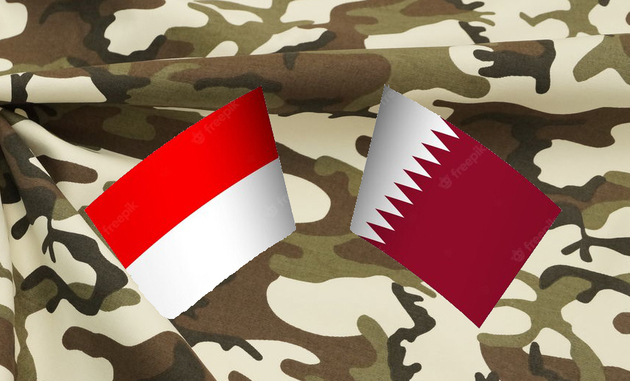In recent years, Indonesia and the Gulf states have steadily fortified their defense ties. Indonesia’s Minister of Defense Prabowo Subianto made state visits to Saudi Arabia and the UAE this year and to Bahrain last year to discuss ways of strengthening military partnerships, which so far have encompassed the arms trade, exchanges of officers and personnel, and collaborations on defense industry science and technology.
The Diplomat reports that Qatar is another Gulf state with which Indonesia’s military ties have expanded in recent years, in tandem with the growing political, economic, and socio-cultural cooperation between the two nations.
The most recent development took place last month, when the Indonesian Air Force (TNI-AU) reportedly purchased a fleet of used Qatari Dassault Mirage 2000-5 fighter jets, which were retired from service after the government in Doha bought replacements. Despite interests from France and Bulgaria to buy the aircraft, Qatar decided to choose Indonesia as the buyer. It is reported that Indonesia will use these used Mirage 2000-5 fighters as a training and transition platform.
Even though the deal has not yet been confirmed, Naser Al Tamimi, a United Kingdom-based analyst on Asia and Middle East relations, told The Diplomat that Doha’s move was based on the fact that Jakarta made a higher offer than the other two countries, an offer that reportedly exceeded $700 million. In the meantime, Mehran Kemrava, a professor at Georgetown University in Qatar, also told The Diplomat that the decision made by the Qatari government is connected to Qatar’s policy of hedging, whereby it has tried to diversify its relations with as many actors as possible. “As it already has extensive security cooperation with France and Bulgaria, choosing Indonesia would contribute to its strategy,” Kemrava said.
Jakarta’s relations with Doha in the military-security sphere have been gradually expanding for some time, despite being modest compared to Indonesia’s defense ties with other Gulf countries such as the UAE, Saudi Arabia, and Bahrain.
So far, most of the engagements have focused on visits and exchanges. In 2014, for instance, the General Command of the Qatari Armed Forces participated in the hosting of the 13th United Nations Congress on the Prevention of Crime and Criminal Justice in Indonesia, and attended the Indo Defense Forum in Jakarta, where the two countries discussed ways to expand their military and security cooperation.
Beyond military-security-related visits, Indonesia has been interested in expanding its defense exports to Qatar. Although precise data is not available, Indonesian-made light tanks and military weapons are popular in Qatar. The only transaction that was widely reported was Qatar’s planned 2009 purchase of a military aircraft, the CN-235, manufactured by the Indonesian company PT Dirgantara Indonesia. In addition, Qatar has imported outfits for its military forces from PT Sritex, Indonesia’s leading textile and garment manufacturers.
All of these transactions have been driven by the efforts made by Indonesia to promote its military products in the Middle East as a whole. In 2016, for instance, then-Indonesian Minister of Defense Ryamizard Ryacudu invited Qatar’s Minister of Defense Khalid bin Mohammed Al Attiyah to that year’s Indonesian Defense Expo in Jakarta, in which they discussed the possibility of cooperation on defense production. Thereafter, the Indonesian government also invited Qatari delegations to attend Trade Expo Indonesia 2016, which was set up to promote Indonesian military equipment.
These invitations have led Qatari policymakers to begin purchasing military products from Indonesia. Indeed, following the events, the government in Doha expressed its interest in considering military equipment manufactured by three Indonesian state-owned enterprises, namely PT Pindad, PT Dirgantara Indonesia, and PT PAL, which are already supplying military products to other Gulf countries.
As Qatar has been working to upgrade its defense capability, Indonesia, as an emerging value market player, appears to serve as one of the options due to its competitive rates.
Doha’s hedging strategy appears to have been welcomed by Indonesia.
Between 2015 and 2020, the Indonesian government appointed Muhammad Basri Sidehabi, a former air marshal, as the Indonesian Ambassador to Qatar. During Sidehabi’s term, Indonesia attempted to fortify its military-security ties with Qatar. On one occasion, in 2017, he invited Hamad Mohammed Al Marri, the head of the Strategic Studies Center of the Qatar Armed Force, to visit Indonesia to learn more about the Indonesian military industry as well as to attend that year’s Indo-Defense forum in Jakarta. In his meetings with Qatari officials, Sidehabi frequently gave presentations on the development of Indonesia’s defense equipment.
The two sides also signed an agreement for cooperation between the Indonesian National Police and the Qatar Police, focusing on combating juvenile crime and human trafficking, and capacity building among security officers. Moreover, Defense Minister Prabowo separately met with the Qatari Ambassador to Indonesia in 2020 and Qatar’s Defense Attache earlier this year to discuss ways to foster Indonesia-Qatar cooperation in the military-security field and to promote Indonesian-made weaponry.
These meetings seemed to bear fruit in November 2021, when Barzan Holding, the strategic investment and procurement arm of Qatar’s Ministry of Defense, declared its commitment to cooperate with Pindad on weapons procurement, technology transfer, and human resource development. In the same year, a representative and consultant of Barzan, Christopher Ott, was also hired by Jakarta to facilitate Indonesia’s defense sales with the U.S.
Although Qatar is not a global security player, circumstances have also pressured Indonesia to diversify its military-security cooperation. In Jakarta’s view, the United States’ declining role in Southeast Asia and China’s increasing assertiveness in the South China Sea signify its need to find non-traditional security partners, and Qatar seems to be one alternative.
Therefore, for Indonesia, engaging with Qatar in the defense sector serves both to secure markets for its nascent defense industry and to contribute to its efforts to search for new partners beyond its traditional security circles.






